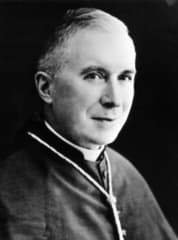アヴェ・マリア・インマクラータ!
愛する兄弟姉妹の皆様、
映画「サイレンス--沈黙--」に描かれなかった "真実" のその2をご紹介いたします。
天主様の祝福が豊かにありますように!
トマス小野田圭志神父(聖ピオ十世会司祭)
(続き)
1633年10月18日、36年前に二十六聖人が殉教した同じ長崎の西坂の丘で8人は穴吊しの拷問を受けます。しかし、5時間の逆さの穴吊りの拷問を受け、イエズス会の管区長であったクリストヴァン・フェレイラ(Christovão Ferreira)は、棄教の合図を出しました。
拷問を与えてフェレイラを背教させたのは、幕府の反キリスト教政策の最大の成果でした。転んだバテレン、すなわち背教司祭は、カトリックの「悪」を証明する生ける証拠として、プロパガンダのために最大限に活用されました。幕府はこの絶好の機会を利用したことは多くの記録から伺うことが出来ます。
フェレイラが転ぶとすぐに江戸に呼び出されしばらくの滞在の後に長崎に戻され、生涯長崎で生活することになります。
幕府はフェレイラに結婚を命じます。彼がそれに応じないのを見ると身の回りの世話をする女中として女性と同居することを命じました。フェレイラが転んだ後に苦しむ心理的な意気消沈を利用し、また女性との結婚を通してフェレイラの人格や自尊心を傷つけ、再起不能にさせようと試みたのです。司祭を結婚させることによって、反対の宣伝に役立ちます。これと同じような作戦が後に、ヨゼフ・キアラとその伴侶たちに対してもなされました。フェレイラにあてがわれた女性も、中国人商人との日本人寡婦で、最初は同居に反対しました。しかし1635年にフェレイラを訪問したポルトガル人商人によると、彼の家に女性がいたのを見ています。
マカオでイエズス会の視察師であったパルメイロに代わって視察師となっているマヌエル・ディエスが、日本に行く船の船長や、日本にいた信頼のおけるポルトガル人たちからの証言を元にローマに報告書を書いています。
ディエス神父は、同時に1635年6月22日付けでフェレイラ宛てに優しい長い手紙を書き、マカオのニュース、パルメイロ神父の死、自分が視察師と任命されたことを述べた後に、フェレイラについての不幸な便りを聞いたがそれについての正確な情報を求め、彼の長上としてまた古くからの友人として(ディエス神父はフェレイラがマカオの神学校で勉強していたとき教授でした)、信仰に立ち戻るように、背教の罪を殉教で償うように訴えます。
この手紙は日本行きの船の大船長(capitão mor)ドン・ゴンサロ・ダ・シルヴェイラに委託されます。ダ・シルヴェイラ船長には、この件についての信頼の置ける正確な情報を得ること、出来ることならフェレイラ自身と話しをすること、が求められ、6月25日にマカオを出て8月9日に長崎に到着します。ポルトガル人は船が停泊している2ヶ月の間フェレイラとコンタクトを取ろうとします。船長ダ・シルヴェイラはあまりにも目立ってしまうので不可能でした。そこで部下にディエス神父の手紙を届けさせ、信頼のおける情報を得よう努めました。10月末に長崎を出港する前に、フェレイラに会うことに成功したポルトガル人たちがおり、そのうちの一人は数回面会しています。当時病気で苦しんでいた視察師ディエス神父は彼らが11月12日にマカオに到着するとすぐに日本からの最新ニュースを聞こうとします。確かにフェレイラは背教したことが確認され、ディエスは内容が真実であることを誓いを立てて証言を書いて提出することを求めました。1636年1月26日のローマへの報告書には、その情報を書き写して報告しています。
ローマに報告されたそれらの信頼性のある証言によると、次のことが分かります。ダ・シルヴェイラからのメッセージを受けたフェレイラは、船長が住む住居のところまで夜、人目を忍んで二回やって来たこと、しかし、船長には背を向けて何も話そうとしなかったこと、フェレイラは船長のところに敢えて来なかったことを或る友に理由を説明して、自分が背教してしまったこと、極めて貧しいので物乞いをしないため、と書いたこと、通訳として働いていること、キリスト教信者たちについて密告しなかったこと、司祭たちを裏切らないこと、です。
ディエスは、別のポルトガル人の証言も引用します。マヌエル・メンデス・デ・モウラで、ポルトガルで結婚した男で義理の兄弟にエチオピアのアフォンソ・メンデス総大司教がいるポルトガル人です。デ・モウラはフェレイラと会うと、フェレイラからアンドレ・パルメイロ神父について尋ねられ、パルメイロ神父は死んだこと、医者と皆の信じることにはフェレイラ神父のニュースを知って後に行った多くの断食と苦行の結果であること、マヌエル・ディエス神父がその後を継いだが、高齢で日本に来られないこと、しかしマカオの多くのイエズス会司祭たちは、日本に来て、フェレイラが殉教の高みまで到達することが出来るためにフェレイラのために命を捨てる覚悟があること、などを告げます。フェレイラは何も答えずに涙を流すばかりでした。デ・モウラも共に涙します。
フェレイラはデ・モウラにこう言います。「天主から離れているなら、その男に一体どんな善が出来ようか?(=自分は背教したので何をしても天主から嘉されない。もうダメだ。)」そして40時間の聖体礼拝の信心はまだマカオの神学校で行っているかと尋ねます。デ・モウラはより熱心にやっていること、教会はもっときれいに飾られていること、殉教者の記念にマカオの住民は教会に木を植えていること、最後に植えられたのはセバスティアン・ヴィエイラ神父の殉教の記念でその隣には別の殉教者のために場所が取ってあること、皆はそこにフェレイラ神父の殉教記念の木を植えることを期待していること、を言います。ここでもフェレイラは答えず更に多くの涙を流します。
デ・モウラがフェレイラに面会するとフェレイラは雄弁に天主について語り、背教者であるとは信じられないほどで、極めて驚きます。フェレイラは良心の呵責を大きく受け、恥ずかしさでいっぱいでした。フェレイラは天主に祈りを捧げているし、女性とも罪を犯していないことを証言しています。フェレイラが仏教に与したこともないことをもデ・モウラは誓って証言します。
ディエスは同じローマへの報告書で、フェレイラの家で彼に4回面会したペドロ・コルデイロの証言も記録しています。それによると、クリストヴァン・フェレイラ神父はコルデイロといつも静かに話し、過去の拷問の恐れからこのような状態になってしまったことを多くの涙を持って辛く思っていること、神父が立ち戻って過去の行為を償うだろうという希望の印を見せたこと、コルデイロが最後の別れを告げると、涙ながらに「あなたが来年戻ってくるなら、そうなることだろう」と言って、涙を流して、自分の状況が良くなったことを示さずには帰ろうとしなかったことが報告されました。
1636年にマカオからもう一度日本行きの船が出航したとき、ディエスはフェレイラに最後の訴えをし、痛悔し償いをするようにもう一度勧告する手紙を書きます。船長はやはり同じドン・ゴンサロ・ダ・シルヴェイラでした。しかし彼らが8月8日に長崎に到着したとき、人工的に作られた出島に停泊するように命じられます。船長は江戸に出向いて報告するように、また、翌年のポルトガル船が来るまで長崎に人質として残るように命じられます。ポルトガル船は10月中旬に、日本を追放されたポルトガル人証人とその家族や使用人たち287名を乗せて長崎を出ます。シルヴェイラは日本に人質として残ったので、ディエスはフェレイラについて別の信頼のおける証人たちから情報を得ます。
それらの信頼のおける証言によると、フェレイラは「結婚」したこの女性をは如何なる関係も持たなかったこと、フェレイラは食事のためだけに彼女と一緒にいること、また、彼は(少なくとも最初の内は)、如何なる方法でもキリスト者を迫害したこともなく、他の宗教に与したこともないこと、拷問による傷から回復するために奉行は彼に貧しい小屋を与えたこと、フェレイラが奉行に食べ物を要求したとき、次の答えが返ってきたこと「奉行はおまえに何もやらぬ。おまえは単に弱さの故に転んだだけだからだ。おまえは何の奉仕もしていない。おまえはバテレンもキリシタンも裏切っていないからだ。」などが分かっています。
フェレイラは、沢野忠庵という日本名を与えられ、日本人の着物を着て、その他の日本人のように生活し、翻訳などの仕事の報酬としてわずかな生活費を奉行から受けていました。寺請制度により、住民はどこかの仏寺の檀徒にならなければならず、それが毎年調べられ、宗門改帳とか、宗旨人別帳とか言われるものに記載されるようになりました。旅行するときの往来手形にも仏寺の檀徒であることを証明せねばなりませんでした。フェレイラも仏寺に属することが強制されました。初期は転びキリシタンだけに義務づけられたものでしたが、1660年代以降すべての人びとが檀那寺に所属するようになります。
1636年11月1日、マカオのイエズス会の会員たちは集まり、つまずきと悪い噂を避けるためにフェレイラの退会を決議します。
11月2日にフェレイラ退会の書類が作られ、そこにいた全てのイエズス会司祭たちによって署名されました。京都においてフェレイラの元長上だったモレホン老神父は、震える手で最後に署名しています。
参考までに、フェレイラが「絵踏み」を考え出したと時々言わますが、既に彼の転びの前に存在していました。「絵踏」とは、キリストやマリアの像を踏ませて、キリシタンで無いことを証明させることですが、最初は転びキリシタンに転びの証明として、または転ばせるために行われました。
フェレイラの改心のために
フェレイラが背教から立ち戻るために、彼にコンタクトを取って説得しようとする試みが少なくとも3回ありました。
最初の試み:
イタリア人のイエズス会司祭であったマルチェロ・マストリッリ(1603-1637)が最初に接触を試みます。マストリッリは日本に向かって出航し、上陸するやいなや逮捕され、長崎で穴吊りの拷問を受けます。1637年10月17日、三日間の拷問の苦しみの後に穴から出されて首を切られました。
マルチェロ・フランチスコ・マストリッリ神父(Marcello Francisco MASTRILLI)はイタリア生まれ、ナポリのマストリッリ侯爵の子供で、イタリアで最も位の高いカラッチョロ家の貴族の母親を持ち、1618年に15才でイエズス会に入会しています。
1633年10月18日、日本の長崎の西坂で、ジュリアン中浦、アントニオ・デ・ソウサ、日本人修道士のペドロとマテオ、ドミニコ会員のルカス・アロソノ神父、フランシスコ会日本人イルマン・マテオらが穴吊りの拷問を受け、クリストヴァン・フェレイラが背教しますが、その同じ年、1633年12月8日、日本から遠く離れたイタリアのナポリではブラカッチョ枢機卿は聖母の無原罪の御孕りの大祝日を盛大に祝っていました。
ロウソクの光をともすためのシャンデリアや燭台、豪華なカーテンなどの飾り付けがなされていました。それらの装飾を取り外す際に、重い梁が天上から私たちのイエズス会司祭マストリッリ神父の頭をめがけて落ちてきました。
両親は子供たちのために聖母の取り次ぎを祈ってきました。マルチェロが生まれたときも、すぐに洗礼を授け、天主に捧げ、イエズス会へと約束していました。聖フランシスコ・ザベリオは、頻繁にマルチェロに現れ、ある日彼に巡礼の道具と光の灯ったロウソクを与え、どちらかを選べと言いました。巡礼の道具はインドを、ロウソクは病による死を意味していました。彼は「私は天主様がお望みのものを選びます」と答えます。マルチェロが頭に致命傷を受けたとき、彼は30歳、イエズス会入会後15年のことでした。マストリッリはすぐに医師の元に運ばれますが、彼の回復は不可能だと宣言されました。しかし、瀕死のマストリッリ神父は聖フランシスコ・ザベリオが自分に現れたのを見ます。
聖フランシスコ・ザベリオは、白い服を着て深紅の十字架を胸に付けてこう言います。
「おお!マルチェロ、おまえが望むことを私に言いなさい。私は天国で力ないものでは無いということを知りなさい。」
彼はいつものように「私は天主様がお望みのものだけを選びます」と答えます。同時に、聖フランシスコ・ザベリオの周りにいる白い服を着た人々を見て、彼らは日本の殉教者たちですか?聞きます。聖人は次のように答えます。「彼らはおまえの友人たちであり、おまえのために祈っている。」
マストリッリの死は近づき、管区長デ・サングロ神父がマストリッリ神父の元にやって来ます。そこでマストリッリ神父は、管区長にインドのミッションのために身を奉献する誓願を立てる許可を求め、聖フランシスコ・ザベリオの有名な奇跡の聖画を乞い求めました。インド行きの誓願は許され、御影が寝台のもとに運ばれます。終油の秘蹟を受けますが、飲み込むことが出来なくなっていたので、旅路の糧の聖体は与えられませんでした。それを嘆いたマストリッリ神父は聖フランシスコ・ザベリオの聖遺物を喉に当てると、その後、御聖体を飲み込むことが出来るようになりました。その夜、次のような声を聞きます。
「マルチェロ!マルチェロ!」
彼は巡礼者の姿をした光に輝く聖フランシスコ・ザベリオを見ます。聖人はこう言います。
「おまえは癒やされる。感謝として十字架像の傷に接吻をせよ。首に十字架の聖遺物を付けなさい。自分をすべて主に奉献しなさい。主の聖名のために自分の血を最後の一滴まで流す恵みを乞い求めなさい。主に、主のしもべであるインドの使徒フランシスコ・ザベリオでさえも何年もの労働の後で受けることが出来なかったその御恵みを求めなさい。」
聖人は姿を消し、マストリッリ神父はその時、癒やされます。
起き上がって長上に起こったことを全て報告し、翌日、何の痛みも無く感謝のミサを捧げます。フェレイラが背教したという哀しい知らせがヨーロッパに伝わると、多くのイエズス会士たちは総長に懇願して、日本に行って自分たちの兄弟の転びを殉教で償う許可を求めます。マストリッリ神父がそのもっとも熱烈な懇願者でした。総長は「聖フランシスコ・ザベリオ自身があなたにその許可を与えたのですから、私にその許可を求める必要はほとんどありませんよ。」
ナポリを出るときに特に聖フランシスコ・ザベリオの保護に身を委ねて、「フランシスコ」の名前をつけました。
1635年、23名の修道士がリスボンを出港します。その長に選ばれたのがマルチェロ・フランチスコ・マストリッリでした。
リスボンからインドのゴアに渡り、ゴアからマカオへ来ますが、日本とポルトガルとの貿易断絶のために日本に行く船がありませんでした。そこでマカオからマニラに渡ります。マカオはスペインの貿易のセンターでしたが、日本とスペインも貿易を断絶していました。マニラにいたスペイン人たちは、マストリッリ神父が日本に渡航することに猛烈に反対したので、マストリッリ神父以外は全てマカオに戻ります。
マストリッリはマニラにいた日本人たちを指導しながら日本語を学びます。日本渡航の機会を待っていました。日本人キリシタンたちも多くが同行を希望します。マニラ総督セバスチアン・フルタード(Don Sebastian Hurtado)の特別の計らいで、マレー諸島に出没する海賊に対抗するために出航したスペイン船が、日本の近くを通過するとき、小舟で下船することを許され、マストリッリは乗ってきたスペイン船を降りて、小舟で薩摩の海岸に上陸します。時に1637年9月19日のことでした。
さらにマストリッリは、九州東海岸を北上して、日向のある港に日本人一人を連れて上陸し、森に身を隠します。
別の日本人たちは、九州の海岸沿いに移動している間に発見されて捕らえられています。彼らは拷問を受けるとキリスト者だと自白し、実はマストリッリ神父がいることを告げてしまいます。直ちに捜索がなされ、飢えて弱っていたマストリッリ神父が発見されます。発見されたとき「来なさい、私の子供たちよ、私を連れて行きなさい」と言います。神父は200名の護送兵を付けられて長崎に護送されます。長崎までの移動に1ヶ月がかかりました。
彼は役人に言います。
「将軍に申し上げたいことがあって、聖フランシスコ・ザベリオの使節として来ました。」
「聖フランシスコ・ザベリオとは誰か?」
「聖フランシスコ・ザベリオは、初めて日本人にキリストの福音を伝えた方で、1552年中国の上川島で亡くなりました。この聖人の体は死にましたが、霊魂は生きています。その証拠に、私自身がナポリで致命傷を受けたとき、私を生き返らせてくれました。」
奉行らは、マストリッリ神父の態度と言葉に感服しますが、将軍の命令には従わなければならないと言って、二日間、水責めと梯子責めを加えました。
三日目に「おまえはマニラの総督から遣わされて来たのか?」と尋ねられると「総督の命令できたのではありません。将軍をキリシタンとして、できるなら日本人全部をそうしたいと思って参りました」と答えました。
刑場に連れて行かれ、裸にされ、赤く焼けた焼きごてを陰部に押しつけられました。
「私は、我が身の全てを天主様に捧げておりますから、いかなる苦しみをも拒みはいたしませぬ。しかし、私の手足だけでは足りず、人間の羞恥心を傷つけるこの汚らわしい拷問は、如何なる野蛮人もいたしませぬぞ」と神父は言いました。役人はこの拷問を中止します。その代わりに水責めを開始し、息が絶えそうになるまで続けました。
1637年10月14日水曜日午前11時、説教が出来ないように釘を立てた鉄板を口にかまされて縄と鎖で体を固く縛られて、駄馬に載せられて町中を引き回しに去れながら、刑場に連れて行かれました。穴吊りです。口の鉄板は外され、穴の中に逆さにつり下げられ、足首だけを外に出して蓋をされました。マストリッリ神父は、脱魂状態になって四日間、10月17日の午後3時まで吊されたままでした。
翌日、長崎では祭りだったので、早く殺すために神父は穴から引き上げられました。神父はまだ元気で、「何故、引き上げたのですか?」と尋ねるほどでした。役人は「斬首するためだ」と答えます。神父は跪いて聖フランシスコ・ザベリオの保護を祈り求めると、刑吏の刃の第一撃は、かすり傷さえ与えませんでした。第二撃ではかすかなかすり傷がつきます。刑吏は恐れて太刀を捨てます。「つとめを果たしなされ」というマストリッリ神父の励ましで、刑吏は再び太刀を取り、第三撃で神父の首は地に落ちました。その時、天が暗くなり地が揺るぎ、見物人らは恐れおののいたと報告されています。遺体は寸断され、焼かれ、川にまかれました。
マストリッリ神父は、日本の地に自分の血を流すことしか出来ませんでした。フェレイラ神父と会うことも適わず、日本人に洗礼を授けることも出来ず、祈りと犠牲と苦しみだけの日本滞在でした。彼の聖徳の高さ、知識、霊的生活、犠牲心、愛徳、生まれの高貴さなどは、一見して無駄になったかのように見えます。
1637年10月17日の殉教の日から数えて13年後の1650年11月5日に死を迎えるクリストヴァン・フェレイラ神父は、その霊魂に、この殉教から流れ出る恵みを受けることになるでしょう。
マストリッリ神父については、Japanese Sketches をご覧下さい。
愛する兄弟姉妹の皆様、
映画「サイレンス--沈黙--」に描かれなかった "真実" のその2をご紹介いたします。
天主様の祝福が豊かにありますように!
トマス小野田圭志神父(聖ピオ十世会司祭)
(続き)
1633年10月18日、36年前に二十六聖人が殉教した同じ長崎の西坂の丘で8人は穴吊しの拷問を受けます。しかし、5時間の逆さの穴吊りの拷問を受け、イエズス会の管区長であったクリストヴァン・フェレイラ(Christovão Ferreira)は、棄教の合図を出しました。
拷問を与えてフェレイラを背教させたのは、幕府の反キリスト教政策の最大の成果でした。転んだバテレン、すなわち背教司祭は、カトリックの「悪」を証明する生ける証拠として、プロパガンダのために最大限に活用されました。幕府はこの絶好の機会を利用したことは多くの記録から伺うことが出来ます。
フェレイラが転ぶとすぐに江戸に呼び出されしばらくの滞在の後に長崎に戻され、生涯長崎で生活することになります。
幕府はフェレイラに結婚を命じます。彼がそれに応じないのを見ると身の回りの世話をする女中として女性と同居することを命じました。フェレイラが転んだ後に苦しむ心理的な意気消沈を利用し、また女性との結婚を通してフェレイラの人格や自尊心を傷つけ、再起不能にさせようと試みたのです。司祭を結婚させることによって、反対の宣伝に役立ちます。これと同じような作戦が後に、ヨゼフ・キアラとその伴侶たちに対してもなされました。フェレイラにあてがわれた女性も、中国人商人との日本人寡婦で、最初は同居に反対しました。しかし1635年にフェレイラを訪問したポルトガル人商人によると、彼の家に女性がいたのを見ています。
マカオでイエズス会の視察師であったパルメイロに代わって視察師となっているマヌエル・ディエスが、日本に行く船の船長や、日本にいた信頼のおけるポルトガル人たちからの証言を元にローマに報告書を書いています。
ディエス神父は、同時に1635年6月22日付けでフェレイラ宛てに優しい長い手紙を書き、マカオのニュース、パルメイロ神父の死、自分が視察師と任命されたことを述べた後に、フェレイラについての不幸な便りを聞いたがそれについての正確な情報を求め、彼の長上としてまた古くからの友人として(ディエス神父はフェレイラがマカオの神学校で勉強していたとき教授でした)、信仰に立ち戻るように、背教の罪を殉教で償うように訴えます。
この手紙は日本行きの船の大船長(capitão mor)ドン・ゴンサロ・ダ・シルヴェイラに委託されます。ダ・シルヴェイラ船長には、この件についての信頼の置ける正確な情報を得ること、出来ることならフェレイラ自身と話しをすること、が求められ、6月25日にマカオを出て8月9日に長崎に到着します。ポルトガル人は船が停泊している2ヶ月の間フェレイラとコンタクトを取ろうとします。船長ダ・シルヴェイラはあまりにも目立ってしまうので不可能でした。そこで部下にディエス神父の手紙を届けさせ、信頼のおける情報を得よう努めました。10月末に長崎を出港する前に、フェレイラに会うことに成功したポルトガル人たちがおり、そのうちの一人は数回面会しています。当時病気で苦しんでいた視察師ディエス神父は彼らが11月12日にマカオに到着するとすぐに日本からの最新ニュースを聞こうとします。確かにフェレイラは背教したことが確認され、ディエスは内容が真実であることを誓いを立てて証言を書いて提出することを求めました。1636年1月26日のローマへの報告書には、その情報を書き写して報告しています。
ローマに報告されたそれらの信頼性のある証言によると、次のことが分かります。ダ・シルヴェイラからのメッセージを受けたフェレイラは、船長が住む住居のところまで夜、人目を忍んで二回やって来たこと、しかし、船長には背を向けて何も話そうとしなかったこと、フェレイラは船長のところに敢えて来なかったことを或る友に理由を説明して、自分が背教してしまったこと、極めて貧しいので物乞いをしないため、と書いたこと、通訳として働いていること、キリスト教信者たちについて密告しなかったこと、司祭たちを裏切らないこと、です。
ディエスは、別のポルトガル人の証言も引用します。マヌエル・メンデス・デ・モウラで、ポルトガルで結婚した男で義理の兄弟にエチオピアのアフォンソ・メンデス総大司教がいるポルトガル人です。デ・モウラはフェレイラと会うと、フェレイラからアンドレ・パルメイロ神父について尋ねられ、パルメイロ神父は死んだこと、医者と皆の信じることにはフェレイラ神父のニュースを知って後に行った多くの断食と苦行の結果であること、マヌエル・ディエス神父がその後を継いだが、高齢で日本に来られないこと、しかしマカオの多くのイエズス会司祭たちは、日本に来て、フェレイラが殉教の高みまで到達することが出来るためにフェレイラのために命を捨てる覚悟があること、などを告げます。フェレイラは何も答えずに涙を流すばかりでした。デ・モウラも共に涙します。
フェレイラはデ・モウラにこう言います。「天主から離れているなら、その男に一体どんな善が出来ようか?(=自分は背教したので何をしても天主から嘉されない。もうダメだ。)」そして40時間の聖体礼拝の信心はまだマカオの神学校で行っているかと尋ねます。デ・モウラはより熱心にやっていること、教会はもっときれいに飾られていること、殉教者の記念にマカオの住民は教会に木を植えていること、最後に植えられたのはセバスティアン・ヴィエイラ神父の殉教の記念でその隣には別の殉教者のために場所が取ってあること、皆はそこにフェレイラ神父の殉教記念の木を植えることを期待していること、を言います。ここでもフェレイラは答えず更に多くの涙を流します。
デ・モウラがフェレイラに面会するとフェレイラは雄弁に天主について語り、背教者であるとは信じられないほどで、極めて驚きます。フェレイラは良心の呵責を大きく受け、恥ずかしさでいっぱいでした。フェレイラは天主に祈りを捧げているし、女性とも罪を犯していないことを証言しています。フェレイラが仏教に与したこともないことをもデ・モウラは誓って証言します。
ディエスは同じローマへの報告書で、フェレイラの家で彼に4回面会したペドロ・コルデイロの証言も記録しています。それによると、クリストヴァン・フェレイラ神父はコルデイロといつも静かに話し、過去の拷問の恐れからこのような状態になってしまったことを多くの涙を持って辛く思っていること、神父が立ち戻って過去の行為を償うだろうという希望の印を見せたこと、コルデイロが最後の別れを告げると、涙ながらに「あなたが来年戻ってくるなら、そうなることだろう」と言って、涙を流して、自分の状況が良くなったことを示さずには帰ろうとしなかったことが報告されました。
1636年にマカオからもう一度日本行きの船が出航したとき、ディエスはフェレイラに最後の訴えをし、痛悔し償いをするようにもう一度勧告する手紙を書きます。船長はやはり同じドン・ゴンサロ・ダ・シルヴェイラでした。しかし彼らが8月8日に長崎に到着したとき、人工的に作られた出島に停泊するように命じられます。船長は江戸に出向いて報告するように、また、翌年のポルトガル船が来るまで長崎に人質として残るように命じられます。ポルトガル船は10月中旬に、日本を追放されたポルトガル人証人とその家族や使用人たち287名を乗せて長崎を出ます。シルヴェイラは日本に人質として残ったので、ディエスはフェレイラについて別の信頼のおける証人たちから情報を得ます。
それらの信頼のおける証言によると、フェレイラは「結婚」したこの女性をは如何なる関係も持たなかったこと、フェレイラは食事のためだけに彼女と一緒にいること、また、彼は(少なくとも最初の内は)、如何なる方法でもキリスト者を迫害したこともなく、他の宗教に与したこともないこと、拷問による傷から回復するために奉行は彼に貧しい小屋を与えたこと、フェレイラが奉行に食べ物を要求したとき、次の答えが返ってきたこと「奉行はおまえに何もやらぬ。おまえは単に弱さの故に転んだだけだからだ。おまえは何の奉仕もしていない。おまえはバテレンもキリシタンも裏切っていないからだ。」などが分かっています。
フェレイラは、沢野忠庵という日本名を与えられ、日本人の着物を着て、その他の日本人のように生活し、翻訳などの仕事の報酬としてわずかな生活費を奉行から受けていました。寺請制度により、住民はどこかの仏寺の檀徒にならなければならず、それが毎年調べられ、宗門改帳とか、宗旨人別帳とか言われるものに記載されるようになりました。旅行するときの往来手形にも仏寺の檀徒であることを証明せねばなりませんでした。フェレイラも仏寺に属することが強制されました。初期は転びキリシタンだけに義務づけられたものでしたが、1660年代以降すべての人びとが檀那寺に所属するようになります。
1636年11月1日、マカオのイエズス会の会員たちは集まり、つまずきと悪い噂を避けるためにフェレイラの退会を決議します。
11月2日にフェレイラ退会の書類が作られ、そこにいた全てのイエズス会司祭たちによって署名されました。京都においてフェレイラの元長上だったモレホン老神父は、震える手で最後に署名しています。
参考までに、フェレイラが「絵踏み」を考え出したと時々言わますが、既に彼の転びの前に存在していました。「絵踏」とは、キリストやマリアの像を踏ませて、キリシタンで無いことを証明させることですが、最初は転びキリシタンに転びの証明として、または転ばせるために行われました。
フェレイラの改心のために
フェレイラが背教から立ち戻るために、彼にコンタクトを取って説得しようとする試みが少なくとも3回ありました。
最初の試み:
イタリア人のイエズス会司祭であったマルチェロ・マストリッリ(1603-1637)が最初に接触を試みます。マストリッリは日本に向かって出航し、上陸するやいなや逮捕され、長崎で穴吊りの拷問を受けます。1637年10月17日、三日間の拷問の苦しみの後に穴から出されて首を切られました。
マルチェロ・フランチスコ・マストリッリ神父(Marcello Francisco MASTRILLI)はイタリア生まれ、ナポリのマストリッリ侯爵の子供で、イタリアで最も位の高いカラッチョロ家の貴族の母親を持ち、1618年に15才でイエズス会に入会しています。
1633年10月18日、日本の長崎の西坂で、ジュリアン中浦、アントニオ・デ・ソウサ、日本人修道士のペドロとマテオ、ドミニコ会員のルカス・アロソノ神父、フランシスコ会日本人イルマン・マテオらが穴吊りの拷問を受け、クリストヴァン・フェレイラが背教しますが、その同じ年、1633年12月8日、日本から遠く離れたイタリアのナポリではブラカッチョ枢機卿は聖母の無原罪の御孕りの大祝日を盛大に祝っていました。
ロウソクの光をともすためのシャンデリアや燭台、豪華なカーテンなどの飾り付けがなされていました。それらの装飾を取り外す際に、重い梁が天上から私たちのイエズス会司祭マストリッリ神父の頭をめがけて落ちてきました。
両親は子供たちのために聖母の取り次ぎを祈ってきました。マルチェロが生まれたときも、すぐに洗礼を授け、天主に捧げ、イエズス会へと約束していました。聖フランシスコ・ザベリオは、頻繁にマルチェロに現れ、ある日彼に巡礼の道具と光の灯ったロウソクを与え、どちらかを選べと言いました。巡礼の道具はインドを、ロウソクは病による死を意味していました。彼は「私は天主様がお望みのものを選びます」と答えます。マルチェロが頭に致命傷を受けたとき、彼は30歳、イエズス会入会後15年のことでした。マストリッリはすぐに医師の元に運ばれますが、彼の回復は不可能だと宣言されました。しかし、瀕死のマストリッリ神父は聖フランシスコ・ザベリオが自分に現れたのを見ます。
聖フランシスコ・ザベリオは、白い服を着て深紅の十字架を胸に付けてこう言います。
「おお!マルチェロ、おまえが望むことを私に言いなさい。私は天国で力ないものでは無いということを知りなさい。」
彼はいつものように「私は天主様がお望みのものだけを選びます」と答えます。同時に、聖フランシスコ・ザベリオの周りにいる白い服を着た人々を見て、彼らは日本の殉教者たちですか?聞きます。聖人は次のように答えます。「彼らはおまえの友人たちであり、おまえのために祈っている。」
マストリッリの死は近づき、管区長デ・サングロ神父がマストリッリ神父の元にやって来ます。そこでマストリッリ神父は、管区長にインドのミッションのために身を奉献する誓願を立てる許可を求め、聖フランシスコ・ザベリオの有名な奇跡の聖画を乞い求めました。インド行きの誓願は許され、御影が寝台のもとに運ばれます。終油の秘蹟を受けますが、飲み込むことが出来なくなっていたので、旅路の糧の聖体は与えられませんでした。それを嘆いたマストリッリ神父は聖フランシスコ・ザベリオの聖遺物を喉に当てると、その後、御聖体を飲み込むことが出来るようになりました。その夜、次のような声を聞きます。
「マルチェロ!マルチェロ!」
彼は巡礼者の姿をした光に輝く聖フランシスコ・ザベリオを見ます。聖人はこう言います。
「おまえは癒やされる。感謝として十字架像の傷に接吻をせよ。首に十字架の聖遺物を付けなさい。自分をすべて主に奉献しなさい。主の聖名のために自分の血を最後の一滴まで流す恵みを乞い求めなさい。主に、主のしもべであるインドの使徒フランシスコ・ザベリオでさえも何年もの労働の後で受けることが出来なかったその御恵みを求めなさい。」
聖人は姿を消し、マストリッリ神父はその時、癒やされます。
起き上がって長上に起こったことを全て報告し、翌日、何の痛みも無く感謝のミサを捧げます。フェレイラが背教したという哀しい知らせがヨーロッパに伝わると、多くのイエズス会士たちは総長に懇願して、日本に行って自分たちの兄弟の転びを殉教で償う許可を求めます。マストリッリ神父がそのもっとも熱烈な懇願者でした。総長は「聖フランシスコ・ザベリオ自身があなたにその許可を与えたのですから、私にその許可を求める必要はほとんどありませんよ。」
ナポリを出るときに特に聖フランシスコ・ザベリオの保護に身を委ねて、「フランシスコ」の名前をつけました。
1635年、23名の修道士がリスボンを出港します。その長に選ばれたのがマルチェロ・フランチスコ・マストリッリでした。
リスボンからインドのゴアに渡り、ゴアからマカオへ来ますが、日本とポルトガルとの貿易断絶のために日本に行く船がありませんでした。そこでマカオからマニラに渡ります。マカオはスペインの貿易のセンターでしたが、日本とスペインも貿易を断絶していました。マニラにいたスペイン人たちは、マストリッリ神父が日本に渡航することに猛烈に反対したので、マストリッリ神父以外は全てマカオに戻ります。
マストリッリはマニラにいた日本人たちを指導しながら日本語を学びます。日本渡航の機会を待っていました。日本人キリシタンたちも多くが同行を希望します。マニラ総督セバスチアン・フルタード(Don Sebastian Hurtado)の特別の計らいで、マレー諸島に出没する海賊に対抗するために出航したスペイン船が、日本の近くを通過するとき、小舟で下船することを許され、マストリッリは乗ってきたスペイン船を降りて、小舟で薩摩の海岸に上陸します。時に1637年9月19日のことでした。
さらにマストリッリは、九州東海岸を北上して、日向のある港に日本人一人を連れて上陸し、森に身を隠します。
別の日本人たちは、九州の海岸沿いに移動している間に発見されて捕らえられています。彼らは拷問を受けるとキリスト者だと自白し、実はマストリッリ神父がいることを告げてしまいます。直ちに捜索がなされ、飢えて弱っていたマストリッリ神父が発見されます。発見されたとき「来なさい、私の子供たちよ、私を連れて行きなさい」と言います。神父は200名の護送兵を付けられて長崎に護送されます。長崎までの移動に1ヶ月がかかりました。
彼は役人に言います。
「将軍に申し上げたいことがあって、聖フランシスコ・ザベリオの使節として来ました。」
「聖フランシスコ・ザベリオとは誰か?」
「聖フランシスコ・ザベリオは、初めて日本人にキリストの福音を伝えた方で、1552年中国の上川島で亡くなりました。この聖人の体は死にましたが、霊魂は生きています。その証拠に、私自身がナポリで致命傷を受けたとき、私を生き返らせてくれました。」
奉行らは、マストリッリ神父の態度と言葉に感服しますが、将軍の命令には従わなければならないと言って、二日間、水責めと梯子責めを加えました。
三日目に「おまえはマニラの総督から遣わされて来たのか?」と尋ねられると「総督の命令できたのではありません。将軍をキリシタンとして、できるなら日本人全部をそうしたいと思って参りました」と答えました。
刑場に連れて行かれ、裸にされ、赤く焼けた焼きごてを陰部に押しつけられました。
「私は、我が身の全てを天主様に捧げておりますから、いかなる苦しみをも拒みはいたしませぬ。しかし、私の手足だけでは足りず、人間の羞恥心を傷つけるこの汚らわしい拷問は、如何なる野蛮人もいたしませぬぞ」と神父は言いました。役人はこの拷問を中止します。その代わりに水責めを開始し、息が絶えそうになるまで続けました。
1637年10月14日水曜日午前11時、説教が出来ないように釘を立てた鉄板を口にかまされて縄と鎖で体を固く縛られて、駄馬に載せられて町中を引き回しに去れながら、刑場に連れて行かれました。穴吊りです。口の鉄板は外され、穴の中に逆さにつり下げられ、足首だけを外に出して蓋をされました。マストリッリ神父は、脱魂状態になって四日間、10月17日の午後3時まで吊されたままでした。
翌日、長崎では祭りだったので、早く殺すために神父は穴から引き上げられました。神父はまだ元気で、「何故、引き上げたのですか?」と尋ねるほどでした。役人は「斬首するためだ」と答えます。神父は跪いて聖フランシスコ・ザベリオの保護を祈り求めると、刑吏の刃の第一撃は、かすり傷さえ与えませんでした。第二撃ではかすかなかすり傷がつきます。刑吏は恐れて太刀を捨てます。「つとめを果たしなされ」というマストリッリ神父の励ましで、刑吏は再び太刀を取り、第三撃で神父の首は地に落ちました。その時、天が暗くなり地が揺るぎ、見物人らは恐れおののいたと報告されています。遺体は寸断され、焼かれ、川にまかれました。
マストリッリ神父は、日本の地に自分の血を流すことしか出来ませんでした。フェレイラ神父と会うことも適わず、日本人に洗礼を授けることも出来ず、祈りと犠牲と苦しみだけの日本滞在でした。彼の聖徳の高さ、知識、霊的生活、犠牲心、愛徳、生まれの高貴さなどは、一見して無駄になったかのように見えます。
1637年10月17日の殉教の日から数えて13年後の1650年11月5日に死を迎えるクリストヴァン・フェレイラ神父は、その霊魂に、この殉教から流れ出る恵みを受けることになるでしょう。
マストリッリ神父については、Japanese Sketches をご覧下さい。










